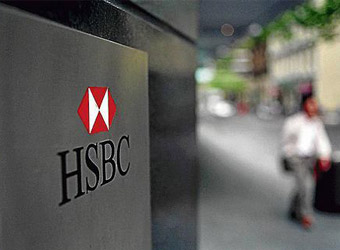HSBC Holdings Plc (HSBA) dropped out of talks to settle a European Union antitrust probe into rigging of Euribor lending rates, according to a person familiar with the investigation, as regulators prepare to hand out fines to settling banks as soon as next month.
HSBC, Europe’s biggest lender by value, pulled out of the negotiations because the discussions stumbled over the possible size of a fine and liability issues, according to a second person who, like the first person, asked not be named because the talks are confidential.
Barclays Plc (BARC), Credit Agricole SA (ACA), Deutsche Bank AG (DBK), JPMorgan Chase & Co. (JPM), Royal Bank of Scotland Group Plc and Societe Generale SA (GLE) also entered into settlement talks with the European Commission, and at least one of those may have also pulled out of the discussions, the person said.
Regulators around the world are investigating whether more than a dozen firms, including Deutsche Bank, colluded to rig various benchmark interest rates to mask their true cost of borrowing. By refusing to settle with the commission in the Euribor probe, banks are giving up the chance of a 10 percent discount in fines in return for admitting that they colluded to manipulate benchmarks.
“The commission may be trying to overstretch its allegations and drive people into admitting to things that they simply did not fully participate in,” said Rony Gerrits, a lawyer at Morrison & Foerster LLP in Brussels. A non-settling party may think it has “a better chance of limiting exposure” in front of the courts, said Gerrits, who isn’t involved in the cases.
December Fines
Banks settling with the EU will agree to admit to collusion over the manipulation of Euribor and may face fines as early as December, one of the people said. HSBC, and others that reject a settlement, would be separately sent a formal statement of objections, likely stretching the process into next year.
Joaquin Almunia, the EU’s antitrust chief, has described allegations of rate rigging as “quite shocking” and has warned that any fines would “not be one euro.”
Antoine Colombani, a spokesman for the European Commission in Brussels, declined to comment on the case. Brendan McNamara, a spokesman for HSBC in London, declined to comment.
Representatives of JPMorgan, Credit Agricole, Deutsche Bank, Barclays, RBS and Societe Generale all also declined to comment.
To gather information, commission officials raided banks, including Deutsche Bank and Royal Bank of Scotland Group Plc (RBS), that offered financial derivatives linked to Euribor in 2011, saying they were investigating possible collusion. The EU sent questionnaires to Barclays and HSBC earlier that same year.
Trading Positions
Barclays, UBS AG (UBSN) and RBS are among firms that have been fined about $3.7 billion for rigging the London interbank offered rate, or Libor, the benchmark for more than $300 trillion of securities worldwide.
Rabobank Groep, the co-operative formed in 1898 to lend to Dutch farmers, was last week fined 774 million euros for its involvement in rigging benchmark interest rates, the second-largest in the global investigation.
Almunia has said regulators are convinced that traders of interest-rate derivatives colluded to manipulate the Euribor and Libor rates of the banks to influence them and obtain a benefit in their own trading positions.
The EU’s antitrust chief has been vocal about his desire to settle both probes by the end of the year and he pointed out what would happen to entities not wishing to play ball.
That would mean facing a formal antitrust complaint, a so-called statement of objections, which would pave the way to a fully-fledged fine.
Reduced Penalty
Settling parties would also receive a short statement of objections, to which they would be invited to merely confirm the content, before the reduced fine would be issued.
The 10 percent reduction “isn’t necessarily considered as an incentive to enter into talks” to settle, Adrien Giraud, a lawyer at Willkie Farr & Gallagher LLP, said in a phone interview.
The “two main drivers” for entering into settlement talks with the commission are to shorten the duration of the infringement and lower the value of the sales — or proxy of sales in this case — taken into account to calculate the fine, Gerrits said.
These discussions “can lead the commission to adopt a decision with a fine that is probably lower than what it would have been in a contentious procedure” as there is more of a negotiation, Giraud said. During bilateral talks the parties “can try to soften the commission’s argumentation.”
Source: Bloomberg


